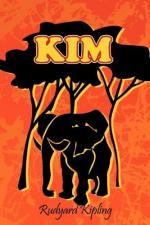The pallor of hunger suited Kim very well as he stood, tall and slim, in his sand-coloured, sweeping robes, one hand on his rosary and the other in the attitude of benediction, faithfully copied from the lama. An English observer might have said that he looked rather like the young saint of a stained-glass window, whereas he was but a growing lad faint with emptiness.
Long and formal were the farewells, thrice ended and thrice renewed. The Seeker — he who had invited the lama to that haven from far-away Tibet, a silver-faced, hairless ascetic -took no part in it, but meditated, as always, alone among the images. The others were very human; pressing small comforts upon the old man — a betel-box, a fine new iron pencase, a food-bag, and such-like — warning him against the dangers of the world without, and prophesying a happy end to the Search. Meantime Kim, lonelier than ever, squatted on the steps, and swore to himself in the language of St Xavier’s.
‘But it is my own fault,’ he concluded. ’With Mahbub, I ate Mahbub’s bread, or Lurgan Sahib’s. At St Xavier’s, three meals a day. Here I must jolly-well look out for myself. Besides, I am not in good training. How I could eat a plate of beef now! ... Is it finished, Holy One?’
The lama, both hands raised, intoned a final blessing in ornate Chinese. ‘I must lean on thy shoulder,’ said he, as the temple gates closed. ‘We grow stiff, I think.’
The weight of a six-foot man is not light to steady through miles of crowded streets, and Kim, loaded down with bundles and packages for the way, was glad to reach the shadow of the railway bridge.
‘Here we eat,’ he said resolutely, as the Kamboh, blue-robed and smiling, hove in sight, a basket in one hand and the child in the other.
‘Fall to, Holy Ones!’ he cried from fifty yards. (They were by the shoal under the first bridge-span, out of sight of hungry priests.) ’Rice and good curry, cakes all warm and well scented with hing [asafoetida], curds and sugar. King of my fields,’ -this to the small son — ’let us show these holy men that we Jats of Jullundur can pay a service ... I had heard the Jains would eat nothing that they had not cooked, but truly’ — he looked away politely over the broad river — ‘where there is no eye there is no caste.’
‘And we,’ said Kim, turning his back and heaping a leafplatter for the lama, ‘are beyond all castes.’
They gorged themselves on the good food in silence. Nor till he had licked the last of the sticky sweetstuff from his little finger did Kim note that the Kamboh too was girt for travel.
‘If our roads lie together,’ he said roughly, ’I go with thee. One does not often find a worker of miracles, and the child is still weak. But I am not altogether a reed.’ He picked up his lathi — a five-foot male-bamboo ringed with bands of polished iron — and flourished it in the air. ’The Jats are called quarrel-some, but that is not true. Except when we are crossed, we are like our own buffaloes.’




